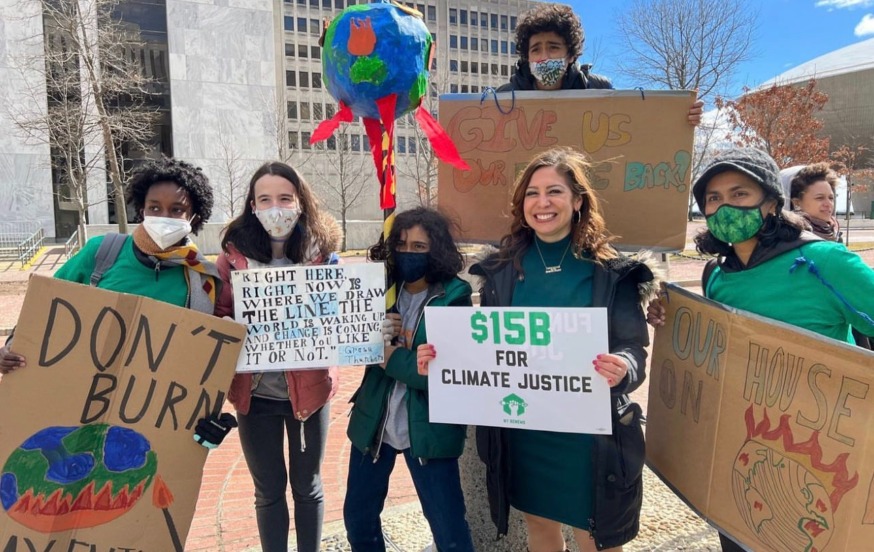
Photo courtesy of Assemblymember Jessica González-Rojas. González-Rojas is pictured holding the sign “$15B for climate Justice”
Op-Ed, Jan. 30, By Assemblymember Jessica González-Rojas
In a time of rampant economic inequality and environmental injustice, it is easy to feel defeated. Here in Queens and across New York State, however, communities are organizing for a better future. New Yorkers from different backgrounds and with different lived experiences are proving that we can build community, organize, and create a future that reflects our shared values.
Right now, across New York State, communities are advocating for the NY Renews coalition’s Climate, Jobs, and Justice Package (CJJP). The CJJP is a legislative avenue for New York to rapidly address the climate crisis, create a healthier and more equitable state, and prioritize the communities that are most impacted by climate change.
New York’s climate crisis is intimately connected with other forms of injustice: racism, xenophobia, unfettered capitalism, food and housing insecurity, and inadequate, or non-existent, healthcare access. Fossil fuel plants are more likely to exist in low-income communities and communities of color due to intentional decisions made by the industry. Consequently, these same communities have increased rates of asthma, respiratory disorders, and premature death. There are an estimated 5 million deaths each year linked just to temperature change, excluding all other impacts of climate change such as natural disasters, increased disease transmission from deforestation, persistent exposure to pollution, and increased rates of suicide and mental health disorders.
For all these reasons and more, in 2021, community organizers successfully fought to prevent a new fossil fuel plant from being built in my district in Astoria, Queens. Progressive legislators, like myself, joined organizers from Queens, East Harlem, and South Bronx, and allies from across the city to demand that the New York State Department of Environmental Conservation deny the fossil fuel company a permit for construction. We can learn from the tenacity of these organizers and continue the momentum at the state level.
Right now, Governor Hochul is working on her executive budget. If she hears the calls of New Yorkers statewide, she’ll include $10 billion to fund the first of three parts of the CJJP,the Climate and Community Protection Fund. This fund would direct the $10 billion to improve and update our energy infrastructure, provide grants to grassroots-led energy planning, support worker transition, and assist low-and middle-income families with energy costs.
The Climate, Jobs & Justice Package also calls on Albany to pass four pieces of legislation that would build a stronger renewable energy sector with union jobs, including the Build Public Renewables Act (BPRA). The BPRA would require the State to build renewable energy projects to reach New York’s mandate of 70% renewable energy by 2030. The BPRA would also democratize the energy sector by increasing transparency and affordability.
Part three of the CJJP establishes policies that would hold fossil fuel companies accountable for the harms they’ve caused, end hundreds of millions of dollars in subsidies to the fossil fuel industry, and levy taxes on the ultra-rich to pay for a just transition.
Passing the CJJPwould empower communities in New York to live happier and healthier lives by decreasing the cost of energy, removing toxic industry sites, providing good union jobs, recognizing the intersection of injustices, and fostering community based on the premise that we are the experts on our own experiences and needs.
Chico Mendes, a Brazilian organizer for workers’ and Indigenous rights and climate protections, said, “Environmentalism without class struggle is just gardening.” If we seek to care for and support our neighbors across all boroughs of New York City and all communities in New York State, we need to start by recognizing that our existence is urgently threatened by the climate crisis and all forms of injustice. We can then transition our words and education into action through legislation and funds that will prioritize New York’s our city’s most vulnerable and uplift us all.
Assemblymember Jessica González-Rojas represents the 34th Assembly District, which includes the neighborhoods of Astoria, Corona, East Elmhurst, Jackson Heights, and Woodside
One Comment

Also more money needs to be allocated to Asylum Seekers in order to properly house them and provide decent food and Healthcare.